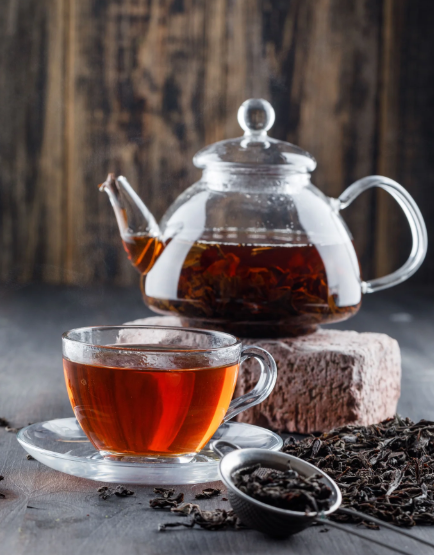
Is Earl Grey Tea Good for You? Health Benefits and Considerations
Earl Grey tea is a beloved beverage, known for its distinctive aroma and flavor, combining rich black tea with the citrusy essence of bergamot oil. Whether you enjoy it as part of your morning routine or as a soothing afternoon treat, Earl Grey tea offers more than just a delightful taste. Many wonder, though, if it’s healthy—especially when it comes to its potential benefits and any possible side effects.
In this post, we will explore the health benefits of Earl Grey tea, its potential risks, and how it can fit into your daily wellness routine. Read on to learn whether this fragrant tea is as beneficial as it is enjoyable.
Health Benefits of Earl Grey Tea
Earl Grey tea is more than just a flavorful drink; it contains several properties that can contribute to your health. Thanks to its mix of black tea and bergamot oil, Earl Grey offers a variety of benefits, from antioxidant effects to digestive support. Let’s break down the key advantages of adding Earl Grey to your routine.
1. Antioxidant Properties
Earl Grey tea is packed with antioxidants, which help combat oxidative stress in the body. The polyphenols and flavonoids present in the black tea base are known for their protective effects, which help neutralize harmful free radicals in the body. These compounds reduce inflammation and may protect cells from damage that can lead to chronic diseases such as heart disease and cancer. By regularly sipping Earl Grey tea, you can boost your antioxidant intake and support overall health.
2. Digestive Health
Black tea, the base of Earl Grey, is well-known for its ability to support digestion, and the bergamot oil adds an extra layer of digestive benefits. Traditionally, bergamot oil has been used to soothe digestive issues such as bloating, nausea, and indigestion. The tea’s soothing properties may also help alleviate symptoms of irritable bowel syndrome (IBS) and promote a healthy balance of gut bacteria. Drinking Earl Grey after meals may ease an upset stomach and support your digestive system.
3. Stress Relief
Earl Grey tea is also famous for its calming effects. The bergamot oil in the tea has been shown to help lower cortisol levels (the stress hormone) and improve mood. Drinking this tea can promote relaxation, making it a great choice after a long, stressful day. Studies have found that even the scent of bergamot can significantly reduce stress, helping you unwind and find mental clarity. For those seeking a natural way to ease anxiety or promote relaxation, Earl Grey is a comforting option.
4. Weight Management
Earl Grey tea may assist with weight management due to its combination of caffeine and polyphenols. The caffeine found in black tea can help boost metabolism and promote fat burning, increasing calorie expenditure. The polyphenols also support the body’s ability to process and store fat, possibly making it easier to maintain a healthy weight. While it’s not a weight-loss miracle, drinking Earl Grey regularly as part of a balanced diet can help manage cravings and provide a low-calorie alternative to sugary beverages.
5. Heart Health
Earl Grey tea’s potential cardiovascular benefits are another notable aspect. The flavonoids in black tea have been linked to better heart health by supporting blood vessel function, lowering cholesterol, and improving blood circulation. Studies suggest that regular consumption of black tea may reduce the risk of heart disease and stroke. Additionally, the antioxidants in Earl Grey tea help reduce inflammation, further benefiting heart health. Adding this tea to your routine can support your cardiovascular well-being and help maintain healthy blood pressure levels.
Potential Side Effects and Considerations
While Earl Grey tea offers a range of health benefits, it’s important to consider potential side effects, particularly for those who consume it in excess or have certain health conditions.
1. Caffeine Content
Like most black teas, Earl Grey contains moderate levels of caffeine. For many people, this provides a helpful energy boost and improves mental clarity. However, excessive caffeine can lead to side effects like jitteriness, restlessness, and difficulty sleeping. If you are sensitive to caffeine or have trouble sleeping, it’s best to drink Earl Grey in moderation and avoid it later in the day.
2. Impact on Sleep
Caffeine, even in moderate amounts, can interfere with sleep. It blocks adenosine receptors, which help promote relaxation and sleep, leading to trouble falling asleep or staying asleep. If you are prone to insomnia or have difficulty sleeping, consider limiting your intake of Earl Grey tea in the afternoon or evening.
3. Allergies and Drug Interactions
Bergamot oil, the key ingredient in Earl Grey, is derived from citrus fruit, which can cause allergic reactions in some individuals. People with citrus allergies may experience skin irritation or digestive discomfort. Additionally, bergamot oil can interact with certain medications, especially those related to cholesterol or blood pressure. It can amplify the effects of medications like statins or blood thinners, potentially increasing the risk of side effects. If you are on medication or have allergies, consult your doctor before adding Earl Grey tea to your routine.
How to Enjoy Earl Grey Tea
To get the most out of your Earl Grey tea, follow these simple brewing tips to achieve the perfect cup every time:
-
Use Fresh Water: Always start with fresh, cold water for the best flavor.
-
Water Temperature: Heat the water to just below boiling (around 200°F or 93°C) to avoid bitterness.
-
Tea-to-Water Ratio: Use one teaspoon of loose-leaf Earl Grey or one tea bag per 8-ounce cup of water.
-
Steeping Time: Steep the tea for 3-5 minutes, depending on your desired strength.
-
Add-ins: You can add milk, a slice of lemon, or a touch of honey to enhance the flavor, but be mindful of adding too much sugar.
Conclusion
Earl Grey tea is a flavorful and aromatic beverage that offers several health benefits. From its antioxidant-rich properties to its ability to support digestion, relieve stress, and improve heart health, Earl Grey is more than just a pleasant drink. With its moderate caffeine content, it can also aid in weight management, making it a well-rounded addition to your routine.
However, it’s important to be mindful of its caffeine content, potential sleep disruptions, and possible allergic reactions to bergamot oil. By enjoying Earl Grey tea in moderation and considering your personal health needs, you can reap the rewards of this soothing, health-promoting beverage.




